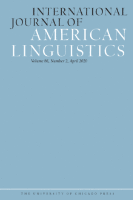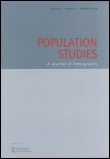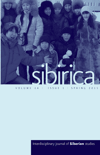
Novye Issledovaniya Tuvy-New Research of Tuva
Scope & Guideline
Connecting Scholars to Tuva's Cultural Narratives
Introduction
Aims and Scopes
- Cultural Studies and Ethnography:
The journal emphasizes the exploration of Tuvan culture, traditions, and folklore, often through ethnographic studies that highlight the lived experiences and practices of the Tuvan people. - Linguistic Research:
A significant focus is placed on the Tuvan language, its structure, usage, and its relationship with other languages in the region, including comparative studies with Turkic and Mongolian languages. - Social and Demographic Analysis:
Research often investigates the social structures, demographic changes, and family dynamics within Tuva, including themes such as migration, adaptation strategies, and the socio-economic challenges faced by the population. - Interdisciplinary Approaches:
The journal promotes interdisciplinary research that combines insights from sociology, anthropology, linguistics, and cultural studies to provide a holistic understanding of Tuvan society and its transformations. - Historical Contextualization:
It also includes analyses of historical events and figures relevant to Tuvan identity, examining how history shapes contemporary cultural and social realities.
Trending and Emerging
- Gender Studies:
There is an increasing focus on gender dynamics, particularly in the context of family structures, roles in society, and adaptive strategies of women and men in contemporary Tuva. - Impact of Digital Transformation:
Research is increasingly exploring how digital technologies and the internet are reshaping social interactions, cultural expression, and language use among the Tuvan youth. - Environmental and Ecological Studies:
Emerging themes include the ecological implications of traditional practices and the impact of climate change on Tuvan livelihoods, reflecting a growing awareness of environmental issues. - Migration and Mobility:
Studies on migration patterns, both internal and external, have gained prominence, particularly in relation to their socio-economic impacts on the Tuvan population. - Cultural Heritage and Identity:
There is a rising interest in the preservation of cultural heritage and the exploration of identity among Tuvans, particularly in light of globalization and cultural exchange.
Declining or Waning
- Traditional Rituals and Practices:
There has been a noticeable decrease in research focusing specifically on traditional rituals and their contemporary relevance, suggesting a shift towards more modern interpretations of Tuvan culture. - Historical Studies of the Soviet Era:
Research dedicated to the specific historical analyses of the Soviet period, including the impact of Soviet policies on Tuvan culture, has become less frequent, possibly overshadowed by more contemporary issues. - Comparative Ethnographic Studies with Other Ethnic Groups:
While comparative studies were once a strong focus, there has been a waning interest in direct comparisons between Tuvan culture and that of other ethnic groups, as researchers may be increasingly focusing on internal dynamics. - Buddhism and Religion:
Although still present, the exploration of Buddhism and religious practices within Tuvan society has seen a decline, possibly due to a shift towards secular and socio-economic themes.
Similar Journals

SCHWEIZERISCHES ARCHIV FUR VOLKSKUNDE
Connecting Scholars to the Heart of Cultural StudiesSCHWEIZERISCHES ARCHIV FUR VOLKSKUNDE, with ISSN 0036-794X, is a vital resource for scholars and practitioners in the fields of Arts and Humanities and Cultural Studies. Published by G KREBS VERLAGSBUCHHANDLUNG AG in Switzerland, this journal plays a crucial role in advancing the discourse surrounding folk culture, traditions, and anthropology. Despite its current ranking in the Q4 category for both Arts and Humanities and Cultural Studies, the journal serves as an essential platform for disseminating unique research findings and insights, contributing to a well-rounded understanding of diverse cultural practices. Researchers, professionals, and students are encouraged to explore the rich content produced between 2008 and 2014, and from 2017 to 2023, which reflects a commitment to fostering a multidisciplinary approach to folklore studies. By addressing the complexities of cultural dynamics, the journal not only promotes scholarly engagement but also enriches the academic community’s appreciation of folk traditions.

INTERNATIONAL JOURNAL OF AMERICAN LINGUISTICS
Exploring the Rich Tapestry of Language and Dialect.The INTERNATIONAL JOURNAL OF AMERICAN LINGUISTICS, published by University of Chicago Press, is a revered scholarly publication dedicated to the exploration and advancement of linguistic studies, particularly those related to the American linguistic landscape. With an ISSN of 0020-7071 and an E-ISSN of 1545-7001, this journal serves as a vital platform for researchers, professionals, and students interested in the nuances of language, dialects, and linguistic structures through rigorous academic inquiry. The journal has established a commendable impact, reflected in its ranking within the Q2 category in Linguistics and Language and its placements in the Scopus rankings, thereby positioning itself within the 50th to 53rd percentile of its respective fields. While the journal does not provide Open Access options, it continues to be a cornerstone resource for those seeking to expand their understanding of American linguistics, already converging from 1996 to 2024. Through its continued commitment to excellence, this publication remains essential for those aiming to contribute significantly to the field.

Balkan Arastrma Enstitusu Dergisi-Journal of Balkan Research Institute-JBRI
Advancing Knowledge of the BalkansBalkan Araştrma Enstitusu Dergisi (Journal of Balkan Research Institute - JBRI) is a leading academic publication dedicated to advancing research and scholarship in the field of Balkan studies. Published by Trakya University, this journal serves as a vital platform for scholars and practitioners to disseminate innovative findings related to the political, cultural, and historical dimensions of the Balkans. With a commitment to open access, JBRI strives to make valuable research accessible to a global audience, fostering collaboration and knowledge exchange among researchers, professionals, and students. The journal's comprehensive scope includes interdisciplinary approaches that encompass sociology, history, political science, and cultural studies, positioning it as a critical resource for those engaged in the exploration of Balkan heritage and contemporary issues. The journal aims to enhance understanding and appreciation of this dynamic region and ensure that it remains a significant focal point of scholarly inquiry.

Lietuvos istorijos studijos
Innovating Perspectives on Lithuania's PastLietuvos istorijos studijos is a prominent open access journal devoted to the multifaceted exploration of Lithuanian history and its broader implications in the context of global historical narratives. Published by Vilnius University Press, this journal has been fostering scholarly communication in its field since 2013, making a significant contribution to the advancement of historical research in Lithuania. With a focus on innovative historical methodologies and interdisciplinary approaches, Lietuvos istorijos studijos serves as a crucial platform for researchers, professionals, and students who are keen to engage with both primary and secondary sources pertaining to the diverse tapestry of Lithuanian heritage. The journal operates under the ISSN 1392-0448 and E-ISSN 1648-9101 and has been classified in the Q4 category in History for 2023, indicating a growing interest and engagement within the academic community. The ongoing convergence of historical studies from 2022 through 2024 further highlights its commitment to evolving research trends. Interested readers can access the journal freely, making it a vital resource for anyone seeking to deepen their understanding of Lithuania's historical landscape.

Epohi
Bridging Perspectives, Shaping Futures.Epohi is a distinguished academic journal published by the St Cyril and St Methodius University Publishing House, focusing on interdisciplinary research in the fields of social sciences and humanities. With its ISSN 1310-2141 and E-ISSN 2534-8418, the journal aims to provide a platform for innovative thought and scholarly discourse, bridging gaps between historical perspectives and contemporary issues. While currently exploring open access options to enhance accessibility, Epohi remains a pivotal resource for researchers, professionals, and students seeking to contribute to and engage with cutting-edge research. Situated in the serene locale of Veliko Tarnovo, Bulgaria, this journal not only enriches the academic landscape but also fosters collaboration and professional growth in the broader scholarly community.

Lingua Montenegrina
Illuminating the Nuances of Montenegrin Literary TraditionLingua Montenegrina is a distinguished academic journal dedicated to exploring and advancing the fields of Montenegrin language and literature. Published by the Institute of Montenegrin Language and Literature, this journal serves as a vital platform for researchers, educators, and students interested in the nuances and development of Montenegrin linguistics, literature, and cultural studies. With an ISSN of 1800-7007, it contributes significantly to the scholarly discourse in the region and beyond. While the journal operates under a traditional subscription model, it ensures that its readership has access to high-quality research that is pivotal for understanding Montenegrin identity and cultural expressions. The commitment of Lingua Montenegrina to rigorous academic standards and its focus on regional studies positions it as an essential resource for those looking to deepen their understanding of the Montenegrin language and its literary heritage.

Cultural & Social History
Unraveling Historical Narratives of Culture and Social ChangeCultural & Social History, published by Routledge Journals, Taylor & Francis Ltd, is a premier academic journal dedicated to exploring the intricate interplay between culture and social developments throughout history. With an ISSN of 1478-0038 and an E-ISSN of 1478-0046, this journal serves as a vital platform for scholars engaged in cultural studies, history, sociology, and political science, having achieved a commendable Q2 ranking across its relevant categories as of 2023. Spanning from 2008 to 2024, the journal has consistently embraced innovative scholarly discourse that encourages interdisciplinary approaches to understanding past and contemporary societal issues. While it is not open access, the journal's rigorous peer-review process ensures high-quality publications, making it an indispensable resource for researchers, professionals, and students alike. With its headquarters in the United Kingdom, Cultural & Social History promotes a global perspective and fosters vibrant academic exchanges, firmly establishing itself as a key contributor in the fields of cultural history and social research.

POPULATION STUDIES-A JOURNAL OF DEMOGRAPHY
Advancing Insights into Population TrendsPopulation Studies: A Journal of Demography is an esteemed scholarly publication dedicated to advancing the understanding of demographic trends and their historical contexts. Published by Routledge Journals, Taylor & Francis Ltd, this journal has a notable impact in its field, recognized as a Q1 category journal in both Demography and History as of 2023. Its Scopus rankings highlight its significance, featuring a remarkable 12th place rank in Arts and Humanities—History and 19th place in Social Sciences—Demography, both underscoring its influential role in academic research. Established in 1947, the journal has consistently contributed to the discourse in population studies, offering a platform for innovative research and critical analysis. While it does not provide open access options, it remains a vital resource for researchers, professionals, and students who seek to explore the complex relationships between population dynamics and historical narratives. Its comprehensive coverage from 1947 to 2024 ensures a rich repository of knowledge, making it essential for anyone involved in demographic research.

JOURNAL OF THE POLYNESIAN SOCIETY
Connecting Scholars Through Polynesian NarrativesJOURNAL OF THE POLYNESIAN SOCIETY, published by Polynesian Soc Inc, is a distinguished periodical that aims to disseminate high-quality research in the fields of anthropology, archaeology, and cultural studies. With an ISSN of 0032-4000 and E-ISSN 2230-5955, this journal serves as a key resource for scholars and practitioners interested in the rich historical and cultural narratives of the Polynesian region. Since its inception, the journal has published a multitude of scholarly articles, reflecting a convergence of research from 1971 to 2022, thus establishing itself as a foundational text within its domain. The journal is indexed in notable categories with a Q4 ranking in anthropology and a Q3 in both archaeology and cultural studies as of 2023, highlighting its relevant contributions to the academic community. Moreover, its impressive Scopus ranks position it within the 80th percentile for archaeology and the 67th percentile for anthropology, showcasing its dedication to scholarly excellence. Although not an open-access publication, the journal remains a vital avenue for academic discourse and exchange, making it a significant resource for researchers, professionals, and students dedicated to understanding the diverse cultures of the Pacific Islands.

Sibirica-Interdisciplinary journal of Siberian Studies
Connecting Cultures, History, and Anthropology in SiberiaSibirica: Interdisciplinary Journal of Siberian Studies, published by BERGHAHN JOURNALS, is a pioneering open-access journal dedicated to the exploration of Siberian studies through an interdisciplinary lens. Since its launch in 2014, the journal has rapidly established itself as a vital academic resource, evidenced by its impressive rankings in the Scopus database, which include a 75th percentile in History and a 64th percentile in Cultural Studies. Catering to a diverse audience of researchers, professionals, and students, Sibirica engages in critical discussions surrounding the anthropology, culture, history, and social sciences of Siberia, enriching our understanding of this complex region. With a commitment to accessibility since 2020, the journal is poised to foster wider scholarly discourse while offering a platform for innovative research and perspectives. Engaging with Sibirica will not only enhance your academic endeavors but also connect you with a vibrant community dedicated to understanding the multifaceted narratives of Siberia.